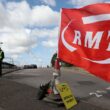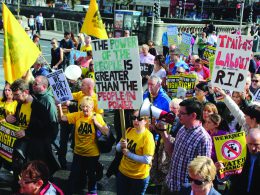By Manus Lenihan
The hype around the ‘ride-sharing’ app Uber has always been shadowed by protests and scandals. But now the Uber Files, released by a whistleblower, have revealed that under the grand phrases about ‘the sharing economy’ there was rampant crime and exploitation.
Across the world, regulations and union contracts have grown up around the taxi industry to protect workers and the public. Then Uber was hyped up as a brilliant new ‘ride-sharing app’ offering convenience and cheaper fares. But the real selling point had nothing to do with technology or innovation. It was about ignoring laws and workers’ rights.
Uber ‘innovation’: extra exploitation
Uber was a race to the bottom, undercutting taxis, making drivers stay on the road for 12-hour days. The company gave its drivers no protections and no rights, as they were not technically employees. Those who signed up to drive for Uber generally did so because they didn’t have a better option. They have found their livelihoods at the mercy of an app.
Uber’s motto should be ‘better to beg forgiveness than permission,’ as they went into each new territory and grabbed as much of the local market as possible before regulators and competitors could respond. Breaking the law was such a consistent part of Uber’s operations that it had a ‘kill switch’ to delete evidence when the police came knocking.
Socialists, unions, taxi drivers and app-based drivers warned about all this at the time, but bosses and high-ranking politicians bought into the hype. As one driver wrote way back in 2016: ‘cities and mayors are just cowering in fear before Uber. I mean, these companies, they set up and break the law and cities just look the other way.’
Whistleblower’s account
Uber’s empire was resisted at every stage of its growth by protests, especially by taxi drivers. But the company’s bosses welcomed the conflict, even as clashes occurred: ‘violence guarantees success.’ They knew exactly what they were doing.
Mark McGann used to be Uber’s highest-profile lobbyist. Now having turned whistleblower he has had a change of heart. He says that he sympathises with anti-Uber protesters, including those who subjected him to death threats! In his view, they were trying to protect their livelihoods, which Uber was seeking to destroy for profit.
The whole process was smoothed over by a systematic lobbying operation. For example, French President Macron, whose aim was to turn France into a ‘start-up nation,’ secretly aided Uber. He gave it frequent and direct access to him as economy minister. He was delighted to let Uber take a battering ram to the conditions of drivers.
Don’t believe the hype
We were promised that ‘start-ups’ and entrepreneur capitalists would lead us to a high-tech utopia. But when the bosses look at the wonderful potential of new technology, all they see is new ways to scam, to spy, to hawk, to exploit. The Uber Files scandal is one part of a growing realisation that ‘the emperor has no clothes.’ Uber, in twelve years of existence, only turned a profit in 2021. The same goes for so many companies whose bosses are hailed as geniuses but which run on hype.
The only way we can ensure that technology is used to improve our livelihoods without ruining others, is by taking big tech companies, and the resources generally of society, out of the hands of the profiteers and into democratic public ownership. Through democratic planning of these resources we can put human ingenuity to use to make all our lives and our environment infinitely better.












